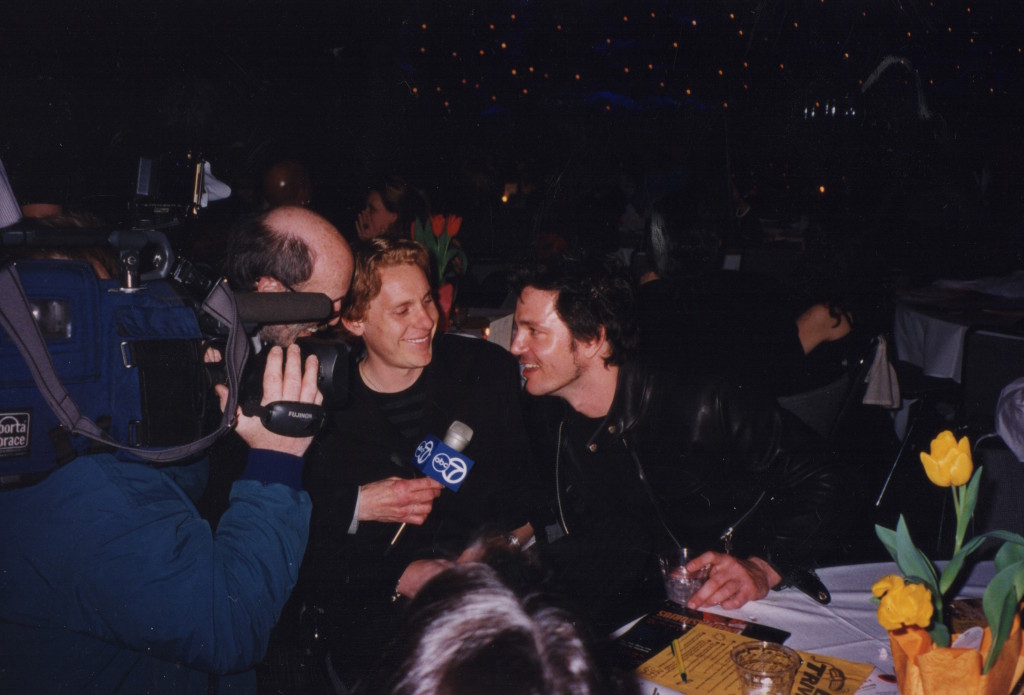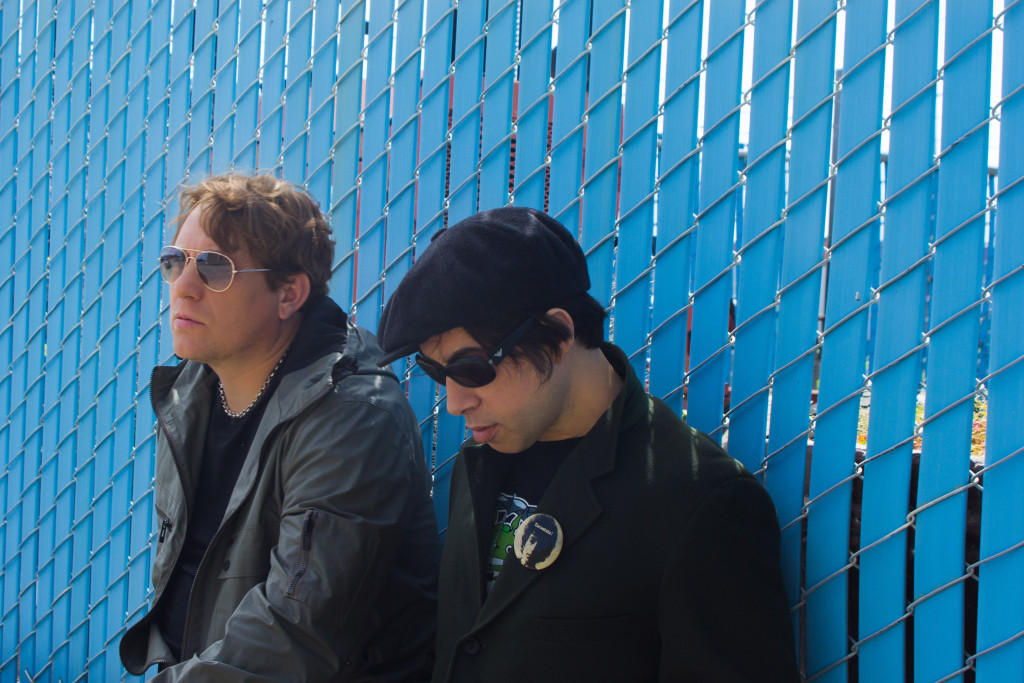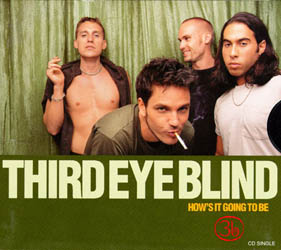How’s It Gonna Be? Founding Third Eye Blind members fight for right to acknowledge contributions

Third Eye Blind in 1998. Photo: Otto Kitsinger
To millions who came into adolescence in the late ‘90s, the names of the songs still jump off the page: “Semi-Charmed Life,” “Jumper,” “How’s It Gonna Be.” The melodies still impart a longing sense of nostalgia. San Francisco band Third Eye Blind enjoyed half a decade of mainstream success with their six-times-platinum 1997 self-titled album and 1999’s Blue.
Xeb: Ex-Third Eye Blind duo adds another member to the club
Read part 2
This summer has seen a resurgence in attention for singer Stephan Jenkins, who’s made headlines by reportedly rescuing paddle boarders in North Carolina, enraging Republican fans at a Cleveland fundraiser during the RNC, and following it up the next week with a Black Lives Matter song that, perhaps, didn’t quite get the reactions Jenkins envisioned. Not that it stopped the band from drawing some of the largest non-headlining crowds at Lollapalooza a couple of weeks later.
Of course, the band that stepped on stage at Grant Park isn’t the same Third Eye Blind that’s responsible for those hits. Infighting splintered singer Stephan Jenkins, bassist Arion Salazar, guitarist Kevin Cadogan, and drummer Brad Hargreaves years ago. What followed was firings, replacement members, lawsuits, court rooms and bitterness that remains to this day.
Third Eye Blind now has five albums to its name, including 2015’s Dopamine. But as the band nears the twentieth anniversary of writing and recording its debut, now-former members Cadogan and Salazar have begun playing the songs they co-wrote at small clubs around the Bay Area. That has led to numerous cease-and-desist letters from Jenkins, who owns the trademark to commercial use of the name “Third Eye Blind,” and, according to previous lawsuits, referred to other band members as contract employees.
“We are not trying to present our sides of a battle,” said Cadogan, the day before a June concert in San Leandro advertised as “Original Members Of Influential 90’s Band Play Their 1997 Debut Album!” The two are planning a show celebrating the anniversary of the debut for late August at 21st Amendment Brewery.
“We don’t have a battle,” he said. “We just want to play our music.”
CONTESTED CADOGAN SALAZAR SHOW LISTING
[gview file=”http://riffmagazine.com/wp-content/uploads/2016/08/Original-May-28-show-listing.pdf”]

Stephan Jenkins and Kevin Cadogan at the Bay Area Music Awards, 1998. Photo: Chelsea Andrus
Cadogan was fired from the band in 2000 after seven years, voted out by the three other members, including Salazar.
“I was being fed a line by everyone surrounding the band—management, lawyers, accountants—and so was [Hargreaves], about how Kevin was making trouble,” Salazar said.
Cadogan had found out that while Jenkins had told him and the others that they were equal partners in the band, he had filed for the band trademark in his name only and was in the process of securing sole copyright to all of the band’s songs, which were co-written by everyone.
“The first album featured ten of my songs, and the second, six,” Cadogan said. “That definitely didn’t sit well.”
Cadogan was able to secure his own copyrights to his songs—the only other Third Eye Blind member to have any ownership.
“What they did subsequently to other band members is, they would take the copyright and make the band member feel like they owned their own songs when in fact they didn’t,” he said.

Courtesy: Kevin Cadogan and Arion Salazar
Tony Fredianelli, the guitarist who went on to replace Cadogan in the band, allegedly got the same treatment before being fired in 2009. He sued Jenkins in 2011 and was awarded nearly half a million dollars. Among the claims in the lawsuit was that Jenkins treated the band members as subordinates, paying them tiny sums for their services and withholding payments.
Cadogan also sued the band, citing fraud, breach of contract, and wrongful termination. He eventually settled out of court. His pay-out was small due to statutes of limitations, he said.
“It was an impossible situation for me to work in a setting where bandmates who had been in a band for seven years together (and) had signed record deals together, (found) out that we’re independent contractors,” Cadogan said. “I tried to explain it to the rest of the guys, but created a lot of discord in the band. I was leveraged out of the group because I wanted shares to be given to the rest of the band members, not just to one guy.”
Third Eye Blind’s first manager faced a similar fate. Eric Godtland was Jenkins’ friend. According to California Superior Court documents, the two met in 1991, and Godtland suggested Jenkins start a band. Godtland personally financed the project, paid Jenkins’ living expenses, and helped write songs. He incorporated the band in 1996, with all shares going to Jenkins, and helped the band land a deal with Elektra.
In a recent call, Godtland said working with Third Eye Blind was the most difficult experience he has ever had as a music professional.
“Other industry professionals around me … would tell me just how bad I had it,” he said. “It was a difficult situation all the way around .… I think Stephan in particular was pretty selfish.”
Godtland mirrored court allegations that the major rift between Cadogan and Jenkins began over whether the other original members agreed to give Jenkins final say in creative and business decisions. He said he was not involved in filing for a trademark on the band name.
“They argued over whether things would be democratic or if Stephan would have final say,” Godtland said. “I think [Jenkins] discovered that he didn’t have a trademark on the name sometime later down the road and had it done.”
In 2008, Jenkins fired Godtland and sued him, saying he was not getting paid enough. Godtland counter-sued, alleging that the band breached its contract and Jenkins specifically put his own interests ahead of others, creating a lack of productivity and a loss of finances for himself and the group. According to the countersuit, Jenkins withheld payment from Godtland until Godtland allowed Jenkins to get a larger share of profits for himself and less to the other band members.
Jenkins’ suit was eventually dismissed. Godtland settled.
The former manager said he stuck with the singer from the very beginning to the point when he was left high and dry. But he was not surprised how his time with the band concluded.
“[But] I always knew what kind of guy I was dealing with,” Godtland said. “Somebody who was self involved and narcissistic.”
[gview file=”http://riffmagazine.com/wp-content/uploads/2016/08/Eric-Godtland-Cross-Complaint.pdf”]

Third Eye Blind in 1998. Photo: Otto Kitsinger
After Godtland was fired in 2009, Jenkins offered the job to tour manager Bobby Schneider, said Schneider, who had been with the band since 1997. Back then, he said he saw a healthy, creative push and pull between Cadogan and Jenkins.
“It turned into an unhealthy rivalry, with Stephan and [Godtland] against Kevin,” Schneider said. “Looking back, it’s obvious Kevin was simply standing up for himself. He was painted as a troublemaker.”
“They [Cadogan and Salazar] definitely got fucked over,” he said.
By the time Schneider was offered the manager job, in 2009, he was hearing from others how difficult it was to work with Jenkins. So he quit. Later Jenkins accused him of stealing the band’s equipment, he said.
“My exit was not good,” he said. “He was an asshole.”
A representative at the band’s Megaforce Records declined comment for this story. Numerous calls and emails to Jenkins’ attorney, Jonathan Kolby, were not returned. Emails to Third Eye Blind’s current publicity team were not answered, either.
Schneider now runs a staging company and is an independent tour producer, working on Sean “P. Diddy” Combs’ reunion tour.
Salazar left the band after one more album cycle, surrounding 2003’s Out of Vein. By that point, he also had become disillusioned. He wasn’t even allowed to keep some of his bass equipment when he left the band, which Jenkins allegedly claimed as his own, an accusation backed by Schneider. He continued to feel bad for his role in Cadogan’s ouster. And then the two East San Francisco Bay residents ran into each other five years ago at a DMV office.
Cadogan invited Salazar to play some of his original songs with him at an upcoming show.
“At that point I hadn’t played music at all in two years,” Salazar said. “It was a really big deal because he got me to play music again.”
Salazar told Cadogan how he had departed in worse circumstances, with no publishing rights.
“It (was) difficult forgiving (Salazar) for stabbing me in the back,” Cadogan said.
For that show, Cadogan and Salazar included in their bios that they were original members of Third Eye Blind. Soon after, they received their first cease-and-desist letter from Jenkins, who had a problem with any use of his band’s name for a commercial purpose.
They have continued to receive such notices for most of their shows, even though they quickly dropped all mention of “Third Eye Blind” from everything other than biographies. Most recently, Jenkins and Third Eye Blind successfully lobbied ticket service Eventbrite to remove all mentions of the name off the Cadogan Salazar (as the duo is calling themselves) event listing in June.
“Due to a trademark violation complaint we received, we were obligated to remove all references to ‘Third Eye Blind’ from the event listing,” Eventbrite spokeswoman Amanda Livingood said. “Eventbrite performs legal analysis on a case by case basis. In this case we concluded that the remove was appropriate.”
Cadogan called the cease-and-desist letter to Eventbrite silly and an extension of Jenkins’ harassment.
“Jenkins is threatened by us, and you can see that it’s a competition to what he’s presenting to the public (of) what Third Eye Blind is,” he said.
Cadogan Salazar shows typically consist of newer material along with a Third Eye Blind album played from start to finish. Between playing those songs, the two tell stories, rarely referring to Jenkins or mentioning his name.
“The only other time Third Eye Blind played the first record from start to finish was on the first tour,” Salazar said. “There’s a lot of songs we’re playing that people haven’t been able to see live … by any version of Third Eye Blind since 1998.”
Even the few songs that Jenkins is credited for writing himself were created together as a band, Cadogan points out. Godtland co-wrote Jenkins’ lyrics, he acknowledged. On “Never Let You Go,” off Blue, Jenkins is the only credited writer, but Salazar wrote the bass melodies, bridge and chord progressions, Salazar said.
“[Jenkins] asked, ‘I really want to get the credit on this one. Maybe if I give you a little more percentage I could just leave my name on it?’” Salazar said.
Trademark law is firm regarding use, but gets stickier when no legal agreement is in place, and it’s often judged subjectively by courts, case-by-case. Federal trademark protection allows the owner of the mark to have exclusive rights to its use for goods and services that it represents, said Erin M. Jacobson, a music industry attorney based in Beverly Hills. Whether Jenkins can stop Cadogan and Salazar from using the name depends on aspects as diverse as the size of the type of the mention of his band’s name on a poster, how they use the name, and whether there is any chance of people being confused by that use, she said.
“If someone buys a ticket thinking they’re seeing Stephan but they’re seeing the other guys, then they’re being misled,” Jacobson said. “They can’t profit off it.”
There are precedents. In 2003, The Beach Boys’ Mike Love sued Al Jardine. Love owns the band’s trademark, and while the band was separated in the late ‘90s, Jardine toured as Beach Boys Family and Friends. Love won the suit. In 2013, former Boston lead singer Fran Migliaccio (also known as Fran Cosmo), toured as “Fran Cosmo former lead singer of Boston.” The band sued him, but he won because of “nominative fair use.” The court decided that he made every effort to put his name above the band’s and not confuse fans, and also because he had to associate himself with the band because otherwise his own fans might not recognize him.
The plaintiffs also failed to prove they would suffer financial loss from his actions, the court ruled.
Los Angeles music law attorney Kamal Moo said the trademark disagreement between Jenkins and the rest of the band is a familiar one. That’s why he always advises his clients to come up with a legal document that clearly spells out the rules in the event members depart or the band breaks up.
Usually, that agreement states that a departing member does not retain any rights to the name.
“If there is no written band agreement, then things get more tricky,” he said. “Most court cases have said that, in the absence of a written agreement to the contrary, former members can advertise themselves as a “former member of Band X” as long as, among other things, they do so in a way that’s not confusing to the public and doesn’t suggest an endorsement by the original band. This hasn’t stopped bands from litigating this issue.”
Cadogan and Salazar insist they’re not trying to take any money or fans away from Jenkins and Third Eye Blind.
“It really is as simple as ‘we wrote it, it’s our music, it’s a part of our legacy,’” Salazar said. “We aren’t getting rich doing it. (We’re) doing something low-key for anyone who would like to come out and see. There are young fans who are probably just starting to realize there were original members that played and made the records that built the foundation and gave the band a career. I like the idea of people getting to learn the history of the band.”
They have no intention of giving in, either, and believe they’re just as entitled to the early Third Eye Blind songs as Jenkins. They’re proud of their accomplishments with Third Eye Blind.
“Move on from something I did that was really cool, that made a big splash, that I was a crucial part of?” Salazar said.
Cadogan and Salazar hope for a peaceful resolution with Jenkins that would allow them to use Third Eye Blind’s trademark, but they don’t predict reconciliation or ever again sharing the stage with their former bandmate.

“What we’d like is to live and let live, ideally, and we’d like to stop being harassed by him,” Cadogan said. “Taking the name for himself, taking all the shares of a corporation. Pieces of paper [were] created to cause problems, and there are pieces of paper that can be created to fix problems, I suppose. But certainly the damage is done there.”
Follow editor Roman Gokhman at Twitter.com/RomiTheWriter.
